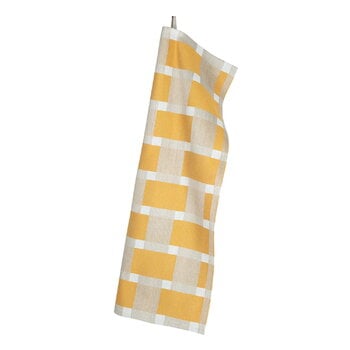The Punos kitchen towel by Lapuan Kankurit is decorated with an abstract pattern whose vertical and horizontal stripes intertwine to create a weave-like motif. Highly absorbent and quick-drying, this versatile kitchen towel works equally well as a dish towel, hand towel or small cloth, adding a touch of style to any kitchen.
Crafted from a blend of European linen and bio-organic cotton, the Punos kitchen towel is woven in the town of Lapua, Finland. Did you know that the brand name Lapuan Kankurit literally translates to "weavers of Lapua"?






